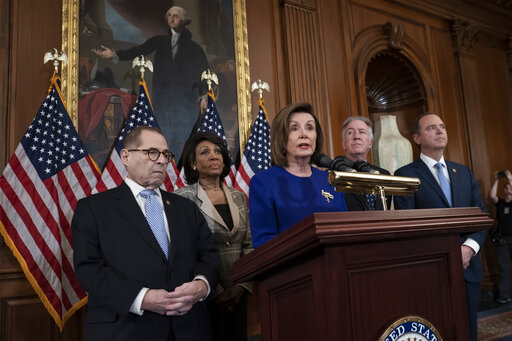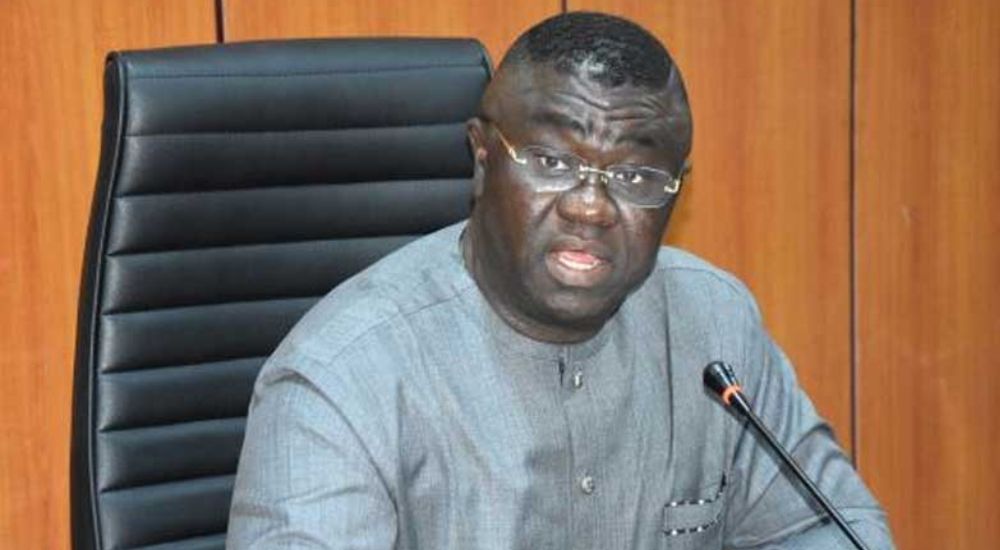Sen. J.D. Vance, R-Ohio, said “all Republicans should oppose” a bill that would provide $95 billion in aid for Ukraine, Israel and Taiwan.
Why? He claims the legislation — which the Senate passed with a 70-29 bipartisan vote — could be weaponized against former President Donald Trump, should he win a second term.
“Buried in the bill’s text is an impeachment time bomb for the next Trump presidency if he tries to stop funding the war in Ukraine,” Vance wrote in a Feb. 12 X post. The post included screenshots of a memo he said he’d sent to his Republican colleagues.
He titled the memo, “The Ukraine Supplemental Includes a Hidden Impeachment Clause Against President Trump.” In it, Vance broke down his argument.
The bill includes about $60 billion to support Ukraine in the war against Russia. Vance’s memo focused on two lines of funding: $1.6 billion for “foreign military financing in Ukraine” and nearly $14 billion for the Ukraine Security Assistance Initiative, the U.S. Defense Department’s effort to help Ukraine’s defense.
“These funds expire on September 30, 2025 — nearly a year into the possible second term of President Trump,” Vance wrote in the memo. “These are the exact same accounts President Trump was impeached for pausing in December 2019.”
Vance argued that if Trump withheld the funding after becoming president, it would amount to “the same fake violation of budget law from the first impeachment, under markedly similar facts and circumstances.” On those grounds, he said, Democrats would again impeach Trump.
Some Republican members of Congress and conservative political commentators and publications amplified Vance’s argument.
“JD is correct,” Rep. Matt Gaetz, R-Fla., wrote in an X post. “This bill is an impeachment trap.”
We searched the bill’s text for the words “impeach,” “impeachment” or “remove,” and found no results. But Vance argued the clause was hidden, so we unpacked his argument and still found it flawed.
The bill merely dictates how money should be spent. Because it is the president’s job to spend congressionally appropriated funds, whoever is elected president in 2024 will be responsible for spending the money allocated in the bill, if it becomes law. The bill does not target Trump; it would apply the same way to President Joe Biden, should he be reelected.
The bill appropriates money. It doesn’t change impeachment laws, procedures
Matthew Green, a politics professor at the Catholic University of America, told PolitiFact that “impeachment is basically irrelevant” to the supplemental appropriations bill.
Several things have to happen for Vance’s impeachment scenario to come to fruition.
“The bill involves impeachment only if (a) it becomes law, (b) Trump is elected president, (c) Democrats win control of the House, (d) Trump decides to ignore the law, and (e) Democrats decide to pursue impeachment in response,” he said.
Currently, the Republicans have a narrow House majority; Democrats control the Senate 51-49. If Republicans retain control of the House, it is unlikely the bill would factor in impeachment proceedings against Trump because the Constitution grants the House the “sole power” to initiate impeachment proceedings and a simple majority vote is required to impeach.
Trump said he believes he could end the war between Russia and Ukraine quickly, and Vance argued in the memo that the bill is an attempt “to stop President Trump from pursuing his desired policy” or provide grounds for impeachment if he pursues it anyway.
Vance’s office pointed PolitiFact to a portion of a Jan. 26 Washington Post story mentioned in the memo. It read, “Not incidentally, a U.S. official said, the hope is that the long-term promise — again assuming congressional buy-in — will also ‘future-proof’ aid for Ukraine against the possibility that former president Donald Trump wins his reelection bid.”
Vance argued that the excerpt shows “that tying President Trump’s hands on foreign policy is very much top of mind for Biden administration officials.” Vance’s office also pointed to two former Trump administration officials, who appeared to agree with Vance’s interpretation.
But it is the elected president’s job, no matter who it is, to spend the funds appropriated by Congress, said Gregory Koger, director of the George P. Hanley Democracy Center and political science professor at the University of Miami. The Congressional Budget Control and Impoundment Act of 1974 underlines that responsibility.
“This is not a ‘trap,’” Koger said.
If Trump wins the 2024 presidential election, it will be his job, Koger said. Same with Biden.
Frank O. Bowman III, a University of Missouri law professor and author of a book about the history of impeachment, told PolitiFact that the funding bill “declares that money should be spent for a particular purpose.”
It “does not target any president or either party,” he said. If passed, it would bind the next president.
“Any president, regardless of party, could, in theory, be impeached for a sufficiently unambiguous violation of law relating to a matter of sufficient national importance,” Bowman said.
Bowman said that the funding provisions “are no more a ‘hidden impeachment clause’ than any provision of any bill.”
Trump’s 2019 impeachment was about more than withholding Ukraine aid
Responding to a conservative think tank’s critique of Vance’s stance, Vance also argued that “the legal ‘core’” of Trump’s first impeachment “rested on” paused aid to Ukraine. None of the previous supplemental Ukraine aid bills, he said, have included “sunset dates stretching into a potential future presidential administration.”
In the bill, some of the money earmarked to support Israel and Taiwan also has a Sept. 30, 2025, sunset date.
Trump’s attempts to withhold Ukraine aid were part of his 2019 impeachment, but his impeachment was about far more than withholding that funding.
In December 2019, the House impeached then-President Trump on two charges: abuse of power and obstruction of Congress.

Speaker of the House Nancy Pelosi, D-Calif., joined by other Democratic leaders, announces that the House is pushing ahead with two articles of impeachment against President Donald Trump on Dec. 10, 2019. (AP)
The abuse of power article focused on Trump’s alleged efforts to coerce Ukrainian officials into investigating a potential political opponent, Biden, by withholding military aid and a sought-after White House visit.
The House approved that charge by a vote of 230-197. No Republicans voted against Trump.
Experts told PolitiFact that Vance’s characterization of Trump’s impeachment was misleading.
“Donald Trump was not impeached in 2019 merely because he had a difference of opinion with Congress over spending priorities,” Koger said. “He was impeached because he was holding Congressionally allocated funds hostage to extort a political favor from Ukraine’s president, Volodymyr Zelensky.”
It’s likely Congress would consider this type of action “unacceptable no matter which country was involved,” Koger said. In that way, “it is not the legislation that ‘traps’ Trump; it is his own behavior.”
Bowman said that Trump’s 2019 withholding of military aid violated law because a president must, by law, spend congressionally appropriated funds once legal conditions are met, which was the case in 2019. Per the Impoundment Control Act, presidents must inform Congress of their intent and reasoning for withholding or pausing aid. In 2019, Trump did not do this, Bowman said.
That law violation, the defiance of Congress, the harm to U.S. security interests and Trump’s personal motive were all part of the first impeachment article, Bowman said.
If Trump, upon reelection, wanted to withhold money Congress had appropriated for Ukraine, he could adhere to the Impoundment Control Act and inform Congress. If Congress passed a bill agreeing to withhold the aid, there’d be no basis to impeach him. If Congress refused within 45 days to pass a bill agreeing to Trump’s plan, “he’d have to provide the aid,” Bowman said.
“If Trump simply ignored the aid authorization legislation and the procedures of the Impoundment Control Act and withheld congressionally mandated aid despite the clear commands of Congress, could he be impeached for that, even without the element of corruption?” Bowman asked. “I think so, but it would be a less compelling case than the 2019 affair.”
Our ruling
Vance argued that the Ukraine supplemental aid bill “includes a hidden impeachment clause against President Trump.”
The bill does not target Trump or say anything about impeachments. It dictates how money should be spent. Experts said it is the president’s job to spend congressionally appropriated funds, so whoever is elected in 2024 will be responsible for spending the money allocated in the bill, if it becomes law.
What could lead to an impeachment scenario is if Trump gets reelected and does not follow the law, but that’s not because of a hidden trap in the funding bill, experts said.
We rate that claim False.








